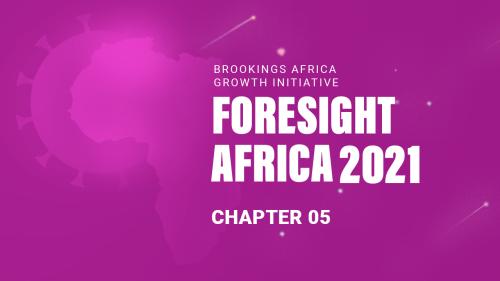Below is a Viewpoint from Chapter 5 of the Foresight Africa 2021 report, which explores top priorities for the region in the coming year. This year’s issue focuses on strategies for Africa to confront the twin health and economic crises created by the COVID-19 pandemic and emerge stronger than ever. Read the full chapter on continental integration.
 The COVID-19 pandemic has upended the world economic order as we know it and may be the gravest challenge that Africa’s leaders have faced since independence.
The COVID-19 pandemic has upended the world economic order as we know it and may be the gravest challenge that Africa’s leaders have faced since independence.
Africa, like other regions, is reeling from the pandemic’s economic and social consequences. The global economic downturn is undercutting every sector of Africa’s economy. Growth is expected to turn negative for the first time in almost 50 years, threatening the hard-won development gains of past decades. An additional 43 million Africans might be pushed into poverty.
It is in these exceptional circumstances that, in August 2020, I was unanimously re-elected to a second term as president of the African Development Bank. Today, more than ever, I feel the burden of responsibility that comes with this honor. It will be my duty to ensure that the Bank rises to the challenge, standing in solidarity with African countries as they respond to the rapidly evolving crisis.
Extraordinary times call for extraordinary measures. Indeed, the International Monetary Fund (IMF) estimates that Africa will need $1.2 trillion over the next three years to recover from the epidemic.
The good news is that African countries have already taken a bold range of actions, from ambitious public health interventions to flatten the curve, to the expansion of social safety nets, to monetary and fiscal interventions on an unprecedented scale.
The Bank responded swiftly in April 2020 by launching a $10 billion COVID-19 Rapid Response Facility, which provides liquidity through crisis response budget support in order to help African governments implement their plans to control and mitigate the virus and its impacts. The month before, the Bank also launched a record-breaking $3 billion “Fight COVID-19” social bond on the global market—the largest-ever U.S. dollar-denominated social bond.
The Bank will continue to leverage its financial standing, its triple-A rating, and its convening power to mobilize the funds Africa needs to build back better and stronger. Each year, the Africa Investment Forum (AIF) brings together development finance institutions, commercial banks, sovereign wealth funds, pension funds, private investors, project sponsors, and policymakers to link Africa’s investment opportunities to sources of capital. Last year’s edition of the AIF developed a pipeline of 230 projects valued at $208 billion.
We will also make full use of the additional $115 billion in capital that the Bank’s shareholders entrusted to us as part of our seventh general capital increase.
Our strategic direction will continue to be guided by our High-5 priorities: Light Up and Power Africa, Feed Africa, Industrialize Africa, Integrate Africa, and Improve the Quality of Life of the People of Africa. Across the High-5s, we will work with African countries and our development partners to identify, selectively, the most strategic investments that will maximize development impact.




Commentary
Building African economies back, better and stronger than before
February 16, 2021